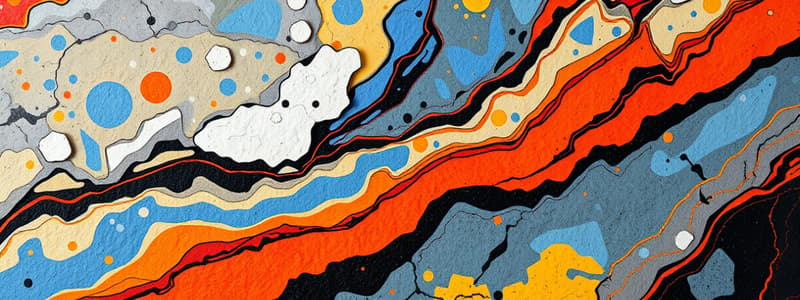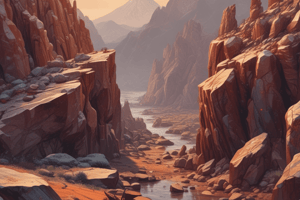Podcast
Questions and Answers
Igneous rock forms from molten rock in the form of ________ or __________.
Igneous rock forms from molten rock in the form of ________ or __________.
magma or lava
Lava cools ________ above Earth's surface.
Lava cools ________ above Earth's surface.
rapidly
Magma cools more ________ below Earth's surface.
Magma cools more ________ below Earth's surface.
slowly
When volcanic material erupts and cools and crystallizes on Earth's surface, it forms a type of igneous rock called ________.
When volcanic material erupts and cools and crystallizes on Earth's surface, it forms a type of igneous rock called ________.
Some extrusive rock cools so quickly that ______ do not have time to grow.
Some extrusive rock cools so quickly that ______ do not have time to grow.
________ is rock that forms when lava cools too quickly to grow crystals.
________ is rock that forms when lava cools too quickly to grow crystals.
Sometimes ______ trapped in the lava escape, leaving holes in the extrusive rock.
Sometimes ______ trapped in the lava escape, leaving holes in the extrusive rock.
Igneous rocks that form as magma cools underground are called _________. They contain large ________ because the magma cools slowly.
Igneous rocks that form as magma cools underground are called _________. They contain large ________ because the magma cools slowly.
As with all types of rocks, the two characteristics that can help to identify igneous rocks are _______ and __________.
As with all types of rocks, the two characteristics that can help to identify igneous rocks are _______ and __________.
If the crystals are small or impossible to see without a magnifying lens, the rock is __________. If all the crystals are large enough to see and have an interlocking texture, the rock is __________.
If the crystals are small or impossible to see without a magnifying lens, the rock is __________. If all the crystals are large enough to see and have an interlocking texture, the rock is __________.
Igneous rocks are classified, in part, due to their _______ content. __________-colored minerals contain more silica.
Igneous rocks are classified, in part, due to their _______ content. __________-colored minerals contain more silica.
Magma composition, the location where the lava or magma cools and crystallizes, and the ______ determine the type of igneous rock that forms.
Magma composition, the location where the lava or magma cools and crystallizes, and the ______ determine the type of igneous rock that forms.
Flashcards are hidden until you start studying
Study Notes
Formation of Igneous Rock
- Igneous rocks originate from molten rock, appearing as magma (below Earth's surface) or lava (above the surface).
Cooling of Lava and Magma
- Lava cools rapidly when exposed to atmospheric conditions, leading to different textures in the rock.
- Magma cools slowly beneath the Earth's surface, allowing for the growth of larger crystals.
Types of Igneous Rock
- Extrusive rock is formed when volcanic material erupts, cools, and crystallizes on the surface.
- Rapid cooling of some extrusive rocks leads to the formation of volcanic glass, which lacks visible crystals.
Characteristics of Extrusive Rock
- Gases trapped within lava can escape during cooling, creating vesicular textures with holes in the rock structure.
Intrusive Rock Characteristics
- Igneous rocks that form from slowly cooled magma underground are classified as intrusive rocks.
- Intrusive rocks contain well-defined crystals due to slower cooling rates, allowing for crystal growth.
Identification of Igneous Rocks
- The two main characteristics for identifying igneous rocks are texture and composition.
- Rocks with small or invisible crystals are categorized as extrusive, while those with visible, interlocking crystals are classified as intrusive.
Mineral Composition
- The silica content in igneous rocks is critical for classification; lighter-colored minerals typically contain more silica.
Factors Influencing Igneous Rock Type
- The composition of magma, the location of cooling, and the rate at which cooling occurs determine the type of igneous rock that forms.
Studying That Suits You
Use AI to generate personalized quizzes and flashcards to suit your learning preferences.



